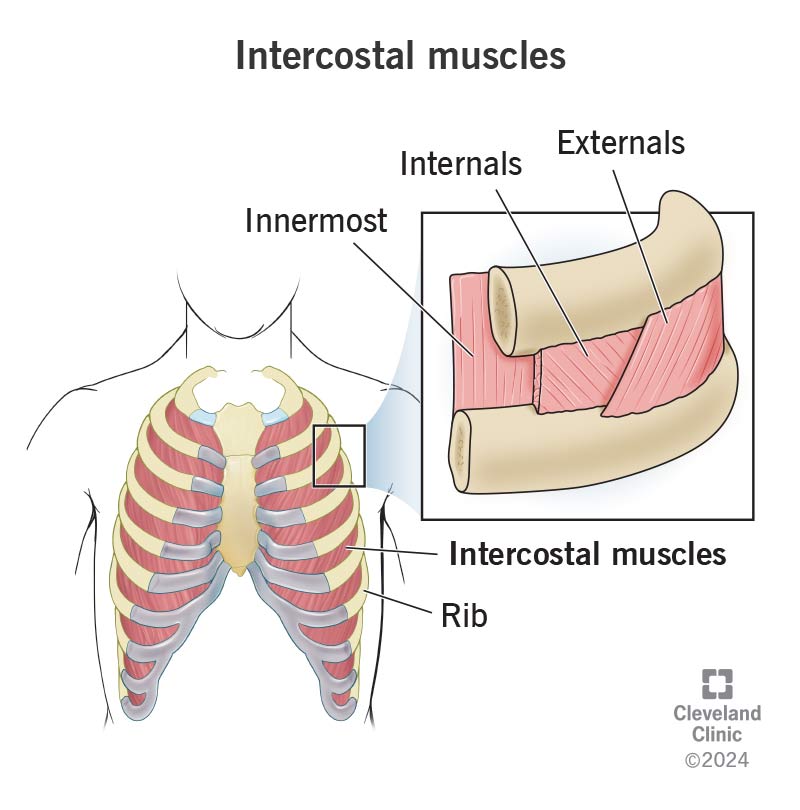The intercostal muscles are part of your ribcage, linking each rib to its neighbors. These muscles work in sets. Their flexing action makes your ribcage expand or shrink depending on which set takes the lead. That makes them a key force in every breath you take.
Advertisement
Cleveland Clinic is a non-profit academic medical center. Advertising on our site helps support our mission. We do not endorse non-Cleveland Clinic products or services. Policy
Your intercostal muscles connect each rib of your ribcage to its neighbors. These muscles are part of your thoracic wall, and the way these muscles flex is part of how you breathe. These muscles span the intercostal spaces — or the gaps between your rib bones. Those gaps also house the nerves and blood vessels that the intercostal muscles rely on.
Advertisement
Cleveland Clinic is a non-profit academic medical center. Advertising on our site helps support our mission. We do not endorse non-Cleveland Clinic products or services. Policy

Image content: This image is available to view online.
View image online (https://my.clevelandclinic.org/-/scassets/images/org/health/articles/intercostal-muscles.jpg)
Your intercostal muscles work together to expand and shrink the space inside your ribcage. You have three types of intercostal muscles:
The internal and external intercostal muscles work like rowing teams pulling in sync. When you inhale, the external intercostal muscles pull together to expand your rib cage. When your rib cage expands, the increased volume (space) inside your lungs creates suction, pulling air in. When you exhale, the internal intercostal muscles work similarly. When your rib cage shrinks, that pushes air out of your lungs and makes you exhale.
Some types of breathing rely mainly on your intercostal muscles. Your intercostal muscles also work cooperatively with other muscles. An example is how they work with your diaphragm when you take deeper breaths.
The intercostal muscles also contribute to other things that involve taking a breath. That includes things like forcefully pushing air out of your lungs when you sigh or cough.
The intercostal muscles get their name from Latin words that mean “between ribs.” They span the 11 intercostal spaces, the gaps between your 12 ribs. Each of your ribs is like a curved beam that wraps around your thorax (your chest and the areas of your sides and back behind it).
Advertisement
Most intercostal muscles attach to two ribs, one above and one below. And each type of intercostal muscle has a specific location between those ribs.
Several conditions and injuries can affect the intercostal muscles directly or indirectly. Some examples include:
Sometimes, your provider may suspect other causes of musculoskeletal chest pain, like costochondritis. Costochondritis doesn’t affect the intercostal muscles directly, but it can cause similar symptoms. Instead, it affects the costochondral joints, which are next to the intercostal muscles.
Symptoms that might affect your intercostal muscles include:
Healthcare providers can check your intercostal muscles during a physical exam. They can also use imaging tests like ultrasound or magnetic resonance imaging (MRI). To check the nerve connections, they can use a nerve conduction study and/or electromyography.
Other tests might be possible, depending on the specifics of your case. Your healthcare provider is the best person to tell you about tests that might help you.
The treatments for intercostal muscle conditions vary widely. Factors that may play a role include your underlying condition, how it’s affecting your muscles and more.
Many conditions or issues that affect your intercostal muscles don’t need treatment and will get better on their own. Other conditions — like minor intercostal strains — are things you can manage on your own.
But conditions that affect your intercostal muscles are more serious and need expert guidance. Your healthcare provider is the best person to tell you more about whether you need treatment and what your options are.
You might not realize it, but you’re using your intercostal muscles right now. They’re a part of every breath you take in and let out. It’s easy to not think about them when they do their job as expected. But if something interferes with how they work, you might not be able to focus on much else. If you have concerns about intercostal muscle symptoms or how these muscles are working, talk to a healthcare provider. They can help you understand what’s happening and how to address it.
Advertisement

Sign up for our Health Essentials emails for expert guidance on nutrition, fitness, sleep, skin care and more.
Learn more about the Health Library and our editorial process.
Cleveland Clinic’s health articles are based on evidence-backed information and review by medical professionals to ensure accuracy, reliability and up-to-date clinical standards.
Cleveland Clinic’s health articles are based on evidence-backed information and review by medical professionals to ensure accuracy, reliability and up-to-date clinical standards.
Cleveland Clinic’s primary care providers offer lifelong medical care. From sinus infections and high blood pressure to preventive screening, we’re here for you.
